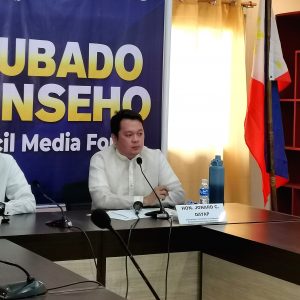Presidential Adviser for Entrepreneurship and Go Negosyo founder Joey Concepcion said that the private sector understands the plight of the medical frontliners and respects the decision of President Rodrigo Duterte to place Metro Manila and nearby areas under modified enhanced community quarantine (MECQ) from Aug. 4 to 18 as COVID-19 cases in the country breached the 100,000 mark.
“We respect the decision of the President,” said Concepcion. “We understand the plight of the healthcare workers and medical groups who are at the frontlines of this disease and commit to fully support them with all the means at our disposal.”
“However, we cannot deny the challenges confronting our economy. We are entering a period of historically strong consumption levels from August to December when we expect most of the businesses to recover their losses. Of course, we will make the best out of the two-week MECQ. Our group is going to launch pooled PCR testing before August 15 and that will help increase the visibility to determine where the infections are. This will be a game-changer. It will speed up testing and make it cheaper. What I’m referring to are not rapid test kits; these are swab tests.”
With no available cure or vaccine available on the market, Concepcion called for a more surgical and localized approach to lockdown that focuses on barangays or local clusters with high infection rates while allowing the rest of the area to operate normally. He points out that selective barangay quarantine is the most sustainable approach to limiting the spread of the virus.
“Part of the plan is to move towards the granular lockdown. But in this case, because of the number of infections rising, I understand that there is a need to revisit our strategies. Two weeks is not too long – we can manage that. But if it goes beyond two weeks then it becomes a little bit more serious,” Concepcion added.
He stressed that the two-week lockdown period will give local government units more time to prepare for a more granular lockdown approach. “Moving forward, to co-exist with the virus, we have to allow a granular type of lockdown and approach the issue from a data-driven standpoint. We get the number of infections in each barangay from the DOH so we know what barangays to lock down. The private sector will fund the 16 cities and 1 municipality for the pooled PCR initial testing this coming August. We will fund that for all these LGUs in NCR. That’s the commitment from the private sector. That’s about P160,000 pooled PCR tests that will be done for this part of the research.”
“Being at the front lines in fighting the pandemic, we, in the private sector, also want to ensure that all healthcare workers will be swabbed/tested through pooled testing. They are on top of our priorities,” he said.
ARK-PCR Private Sector Chief Implementor Janette Garin, is leading the private sector on this initiative. Garin earlier outlined a plan to attack COVID through aggressive testing and prevent non-COVID deaths which will allow partial return to work by way of pooled PCR testing.
Under this method, swab samples of multiple individuals are put into a single PCR test. If a positive result comes from a single batch of pooled tests, further individual assessments will be made. The test is designed to be sensitive enough to come up positive when at least one sample in the batch is positive. On the other hand, if the swab test of multiple individuals comes back negative, then individual tests need not be performed.
Garin explained that a proposed costing mechanism has already been developed which will bring down the cost of testing to PHP450 per person in pools of 5s; PHP350 per person in pools of 10s, and PHP250 per person in pools of 20s, inclusive of PHP150 swabbing fee with VTM. If the study is approved by the Department of Health, pooled testing can be piloted in 21 implementation sites namely 11 Go Negosyo supported laboratories and 5 each from San Miguel Foundation and Ayala Foundation.
Pooled PCR testing is expected to optimize the availability of test kits, reduce the workload of laboratory staff, eliminates large groups of negative cases, makes PCR testing more affordable and available, provides LGUs and businesses with a better and clearer direction, and restores confidence in returning to work while sustaining the gains of the initial lockdown.
“When health meets economy, when testing fills the gap in making social distancing, hygiene practices and other new normal behaviors more effective, we can co-exist with COVID,” Garin said.
“If ECQ is inevitable, let’s do it per city. Granular lockdown should be at least 10 days,” Garin said, echoing the position of Concepcion for a localized and granular approach to lockdown.

